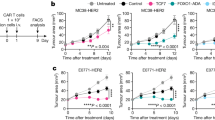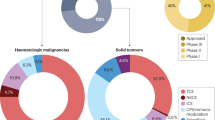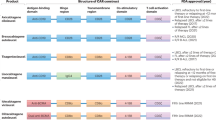Abstract
Despite the strong in vitro activity of some immunotoxins (ITs), clinical application did not result in complete cure. The outcome of therapy may be improved by combining ITs with IT-cytotoxicity enhancing agents. We studied the effect of various agents that influence the intracellular routing of ITs on the activity of the anti-B cell IT CD22-recombinant (rec) ricin A. In protein synthesis inhibition assays the carboxylic ionophores monensin and nigericin enhanced the activity of the IT 117- and 382-fold, respectively, against the cell line Daudi, and 81- and 318-fold, respectively, against the cell line Ramos. IT activity to Daudi and Ramos was enhanced to a lesser extent by the lysosomotropic amines chloroquine (14- and 11-fold, respectively) and NH4Cl (nine- and 10-fold, respectively). However, the combination of NH4Cl and chloroquine induced more than an additive effect (145- and 107-fold, respectively). Cytotoxicity was not influenced by brefeldin A, all-trans retinoic acid (ATRA), verapamil and perhexiline maleate. Bacitracin enhanced the IT cytotoxicity in contrast to the other protease inhibitors aprotinin, leupeptin and soybean trypsin inhibitor, albeit enhancement was weak (two-fold). The enhancers exerted only a negligible effect on bone marrow progenitor cells. We recently developed a flow cytometric cytotoxicity assay in which cell elimination can be assessed. In order to detect enhancement in this assay, we used 5 × 10−11cp6M IT (approximately the 50% protein synthesis inhibiting dose (ID50)). This concentration killed 41% of the Daudi cells and 42% of the Ramos cells. In the presence of 10 ncp6M monensin the IT killed 74% and 99% and in the presence of 10 ncp6M nigericin 96% and 99% of the Daudi and Ramos cells, respectively. At 10−8 cp6M, CD22-rec ricin A eliminated malignant cells originating from three patients with B-CLL (0.42 log) and two with B-ALL (0.19 log) patients. Cytotoxicity to malignant cells was enhanced by NH4Cl, chloroquine, monensin and nigericin. The combination of NH4Cl and chloroquine enhanced the activity most effectively (up to 2.06 log). To determine the applicability of the IT in combination with enhancers in vivo we investigated the effect of human serum. Human serum inhibited IT activity which could not be restored by monensin and nigericin because of complete inhibition of these enhancers by serum. In contrast, chloroquine partially restored the activity of CD22-rec ricin A in the presence of human serum. We conclude that monensin, nigericin and the combination of NH4Cl and chloroquine can be used instead of NH4Cl to potentiate CD22-rec ricin A activity in purging autologous bone marrow transplants contaminated with malignant B cells. Chloroquine might be a promising enhancer of CD22-rec ricin A for treating patients in vivo.
This is a preview of subscription content, access via your institution
Access options
Subscribe to this journal
Receive 12 print issues and online access
$259.00 per year
only $21.58 per issue
Buy this article
- Purchase on Springer Link
- Instant access to full article PDF
Prices may be subject to local taxes which are calculated during checkout
Similar content being viewed by others
Author information
Authors and Affiliations
Rights and permissions
About this article
Cite this article
van Horssen, P., van Oosterhout, Y., Evers, S. et al. Influence of cytotoxicity enhancers in combination with human serum on the activity of CD22-recombinant ricin A against B cell lines, chronic and acute lymphocytic leukemia cells. Leukemia 13, 241–249 (1999). https://doi.org/10.1038/sj.leu.2401262
Received:
Accepted:
Published:
Issue Date:
DOI: https://doi.org/10.1038/sj.leu.2401262



